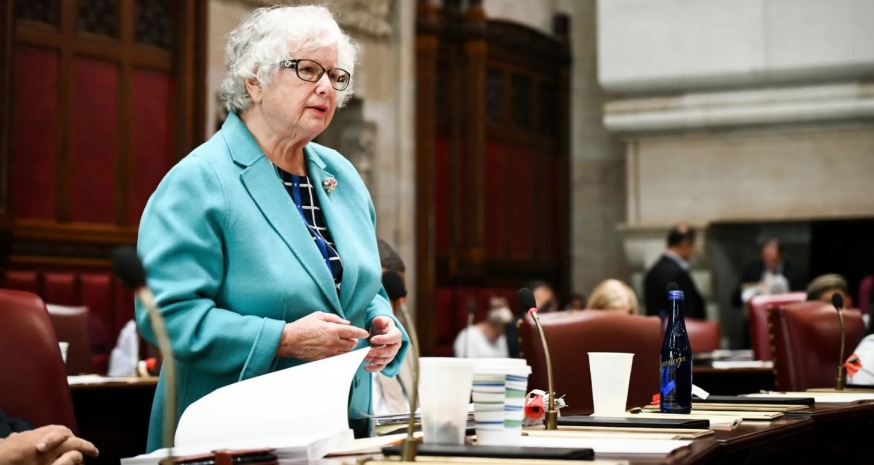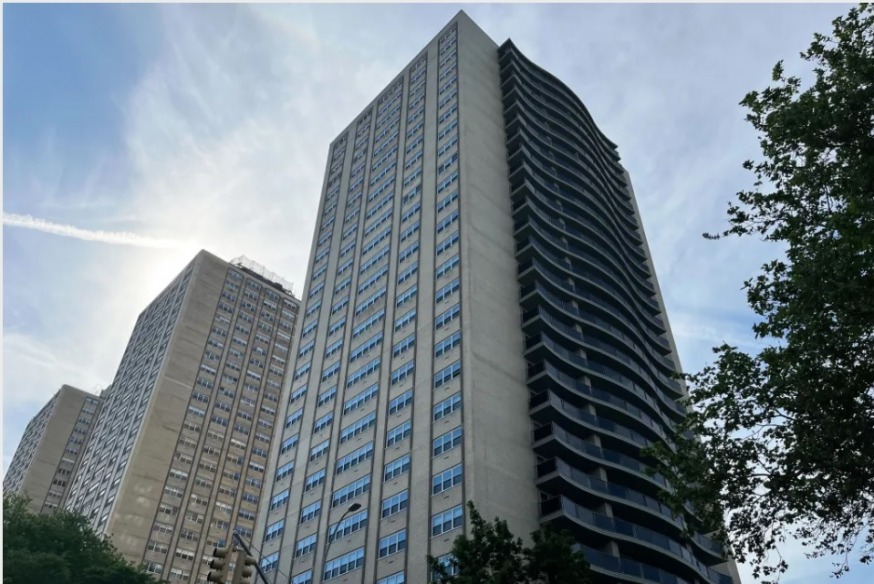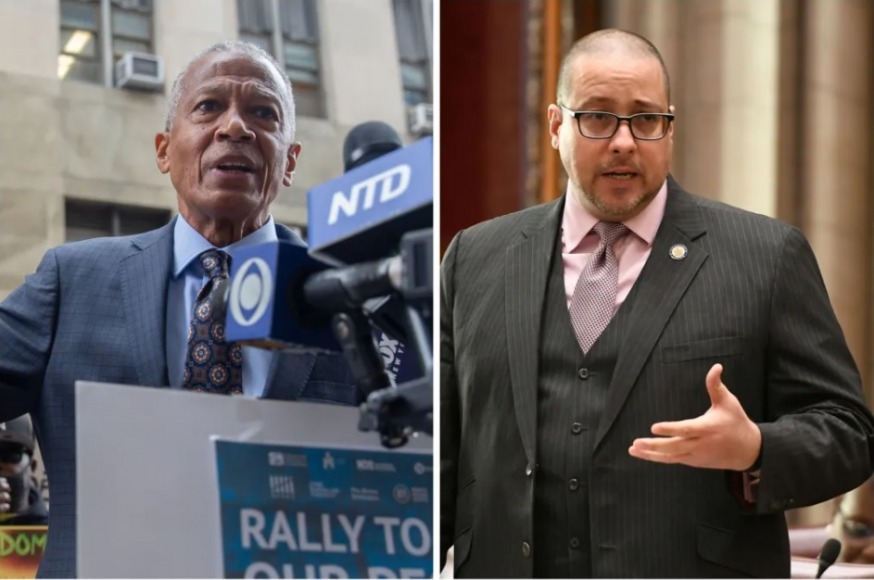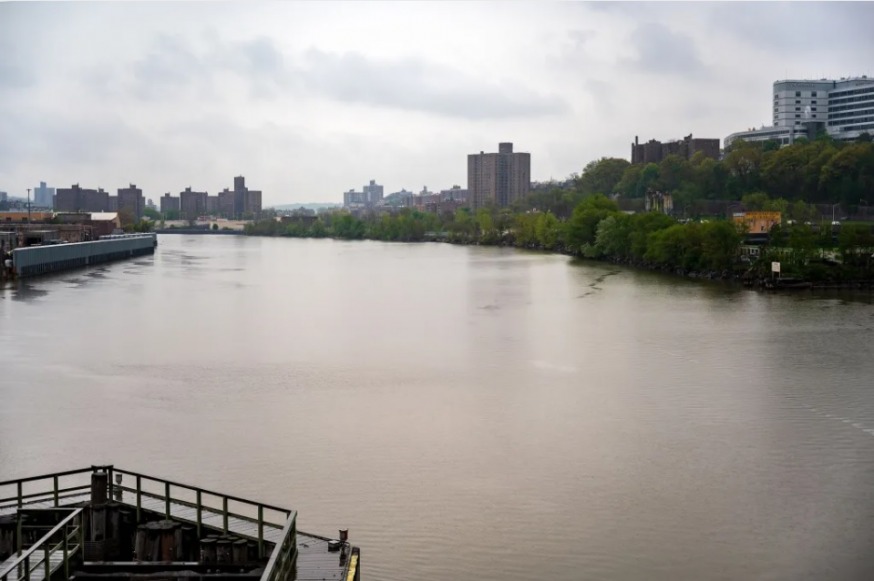
Sen. Stavisky speaks during a session in Albany. NYS Senate Media Services

This article was originally published by The CITY on May 24
State Senators Toby Stavisky in Queens and Gustavo Rivera in The Bronx have both seen their districts altered dramatically in a new court-ordered political map. But one of them has two apartments to choose from — and already lives in the one that’s outside her district.
For veteran members of the New York State Senate thrown into uncertainty by new district lines drawn under court order, real estate is destiny — their choices, like those of any New Yorker, shaped by what they can afford to own or rent and where.
In Queens, Sen. Toby Stavisky saw her current 16th District dramatically reshaped, leaving her with a district where less than 7% of the population are former constituents and an incumbent she’d have to beat.
She has been serving northeast Queens since 1999, after succeeding her late husband in a special election. For the last 10 years her sprawling 16th Senate District has centered on Forest Hills, zig-zagging from the BQE to nearly the Cross-Island Parkway.
But in fact, for the past two years Stavisky has been registered to vote at a different address outside the district seven miles away, about an hour away by three city buses.

The Forest Hills high rise where state Sen. Toby Stavisky owns an apartment inside the district she represents — while she’s registered to vote miles away. Gabriel Sandoval/THE CITY
Property and ethics commission records show Stavisky, who’s 83, owns co-op apartments in two districts, one in Forest Hills — within the boundaries of her current seat — and the other in a complex in Beechhurst, near the Throgs Neck Bridge.
Before the court redrew district lines, Stavisky petitioned to run for the Forest Hills seat from the Beechhurst apartment she’s owned since the 80s, records show.
Neighbors approached by THE CITY said they couldn’t recall when they’d seen the veteran senator.
“Personally, I’ve never seen her. Maybe she’s here when I’m not here,” said a resident of Stavisky’s high rise on Yellowstone Boulevard in Forest Hills. The woman, who declined to provide a name but identified herself as a Democrat fed up with the party’s “stupidness” in Albany, said Stavisky’s absence wouldn’t make a difference to her.
Stavisky could run from either of her two residences — or pick up and move to a third. Where she will run in the upcoming August primary remains a mystery.
“The senator intends to run for re-election and is having discussions with her neighbors, supporters, and colleagues. She will be making an official announcement soon,” said Stavisky campaign spokesperson Tess McRae.
‘Utterly Undemocratic’
The story is very different for Bronx Sen. Gustavo Rivera, age 46, who has served the Kingsbridge area since being elected in 2010, currently in the 33rd District. He’s lived in the same modest brick building on University Avenue for more than 20 years, in a rent-stabilized one-bedroom apartment.
But that apartment is now in the new 31st Senate District — as is the Washington Heights residence of Sen. Robert Jackson (D-Manhattan), which would throw them head-to-head if Rivera runs there. THE CITY’s “Have I Been Redistricted?” tool shows that 56% of residents of that new district had been in Jackson’s old district, which could give the Manhattanite an advantage in winning reelection.

Democratic State Sens. Robert Jackson (D-Manhattan), left, and Gustavo Rivera (D-The Bronx), both of whom live in a new district spanning both boroughs.Ben Fractenberg/THE CITY, NYS Senate Media Services
Unlike Stavisky, Rivera doesn’t have another home to run from. Senate salaries start at $110,000 a year, and state financial disclosures show he reported no outside income and no assets in 2020 — in contrast to Stavisky, who earned between $50,000 and $153,000 in dividends alone, and holds as much as $3.2 million through stocks, mutual funds, bonds and a retirement account.
To have a shot at winning reelection without a bruising battle with another incumbent, Rivera will have to uproot from the neighborhood he’s called home for years and find a new place to live, at a time when rents for vacant apartments are reaching new heights.
Rivera declined to comment to THE CITY, instead pointing to a statement he tweeted Saturday morning, when New York awoke to see the final court-ordered lines. He announced that he’ll be running for the newly drawn 33rd District he currently neighbors— which now spans Riverdale, Bedford Park and Belmont and brings with it 47% of his current constituents, more than any other senator.
Calling the new lines “deeply flawed, utterly undemocratic, and intended to diminish the voices of communities of color in our government,” he declared: “I will be running for reelection in the new 33rd Senatorial District, which includes significant parts of my current district, as well as many communities that I represented when I was first elected to the Senate.”
Seat Shuffle
Election law experts stress that candidates can run from anywhere in a redistricting year, so long as they are a New York State resident. Toggling between two addresses could pose a “politics and optics” problem for Stavisky but it’s perfectly legal since they’re “legitimate residences,” said election lawyer Sarah Steiner.
Determining someone’s residency carries a “hard burden of proof” since New York law provides no clear definition of what constitutes a significant amount of time in their home, Steiner explained.
“Somebody having a couple of residences is no big story. The people who have a rent stabilized apartment and having to move somewhere else” — that’s more problematic, Steiner said.
New York Democrats were so desperate to head off the court-imposed redistricting that Rep. Sean Patrick Maloney — a Hudson Valley Democrat who heads the Democratic Congressional Campaign Committee — urged Gov. Kathy Hochul and other state officials to challenge the lines in the U.S. Supreme Court, said people with knowledge of the discussions.
State senators’ scramble since a draft of the lines emerged earlier this month has been overshadowed by dramatic chess moves from some candidates for Congress — including U.S. Rep. Mondaire Jones of Rockland County, who announced he’s running in a hotly contested new district spanning Brooklyn and Manhattan. Maloney himself is running for Jones’ current seat, as is state Sen. Alessandra Biaggi, who currently represents parts of the Bronx and Westchester.
But lower-visibility state lawmakers were also plotting their next moves during weeks of uncertainty while the courts hammered out the new political lines. Behind closed doors, some Democrats were trying to figure out whether some of them needed to move to avoid going head-to-head with colleagues, according to sources familiar with the private discussions.
“It’s really sad. You see all of these folks coming out of the woodwork against each other and not necessarily discussing what they can do and not holding their powder a little bit so they can come together with a plan,” said Camille Rivera, a Democratic strategist and consultant.
Clashing Lines
Based on her Beechhurst residence, Stavisky could opt to run in the newly drawn 11th District that curves like a backward “C” from the northern portion of Astoria through Whitestone, Beechhurst, Douglaston, Little Neck and Queens Village, cutting out the vast majority of her old district. It wouldn’t be unfamiliar territory: either she or her late husband have represented different portions of Queens almost continuously since 1954, first in the City Council, then Assembly and Senate.
As she’s run for repeated re-election, the district has changed, with Asians now making up the plurality of area residents. Many have been represented by Sen. John Liu, who immigrated from Taiwan as a child, was the first Asian American to be elected to the City Council and hold citywide office and one of the first in the State Senate. Liu’s own Flushing home is in the newly compact 16th district.
After Senate Republicans reconfigured the Senate map in 2012, Stavisky was able to win a newly created, heavily Asian district with the backing of every Asian American elected official in the city at the time, and did not face any Asian candidates. Shortly after that, she purchased her Forest Hills residence within that district, property records show.
Now the court’s redistricting put her building into a district that includes St. Albans, Cambria Heights and Springfield Gardens — historically Black neighborhoods currently represented by Democratic Sen. Leroy Comrie. A spokesperson for Comrie did not immediately respond to request for comment.

The new 31st Senate district spans the Harlem River between Upper Manhattan and Fordham in The Bronx. Hiram Alejandro Durán/THE CITY
Rivera’s residence sets him up for another kind of clash, between two progressive Senate stalwarts.
Jackson has been a champion for public school funding even before he entered politics, as a plaintiff in the Campaign for Fiscal Equity lawsuit against the state. Rivera, meanwhile, has been a staunch ally for New York’s immigrant communities and is the head of the influential health committee, noted Jasmine Gripper, executive director of the Alliance for Quality Education.
“The last thing you want to do is lose your champions for mediocre folks to come in, especially when they both represent their communities,” Gripper said. “Robert Jackson is a Black Muslim man who’s in the Senate. We have Gustavo, a Latino man in the Senate. And it’s like, yes, these folks should be here. They represent New York State. They represent our communities. And there’s no situation where you can really justify why one should be there over,” she added.
THE CITY is an independent, nonprofit news outlet dedicated to hard-hitting reporting that serves the people of New York.
